“Once we have perfect memory, Borges suggests, we are no longer able to generalize and abstract, and so remain lost in the details of our past.”
V. Mayer-Schönberger, "Delete: The virtue of forgetting in the digital age", Princeton University Press, 2009
Delete by Haiku
An artistic mobile application exploring deletion and compression through traditional Japanese poem - Haiku. The creation of the app was made through participations in workshops, interviews, art practices, and design theories.
Interdisciplinary work and collaboration between artist Vygandas Simbelis aka Das Vegas, designer Elsa Kosmack Vaara, and engineer researcher Pedro Ferreira, all conducting research at the Royal Institute of Technology and Mobile Life Centre in Stockholm, Sweden.
Introduction
The artistic mobile application “Delete by Haiku” feeds off the stored SMS messages on the participants’ phones (the app is developed for the Android OS and runs on most modern Android phones) and assists in creating poetry out of past messages, participants can take advantage of different interactive ways of exposed creative process and progressively “delete”, or perhaps rather “compress” personal data into a haiku poem, through this process the application invites participants to engage creatively with their often-cluttered personal message history by partly destroying it and creating something new from it.
The Approach
To think of how one could go about exploring deletion, we met with communities dedicated to Haiku poetry. This traditional Japanese form of poetry is marked by a three-line structure, where the syllables per line are, in order 5-7-5. What inspired us in Haiku was two-fold. First, it represents a compressed form of text, which helped our thinking on deleting (or compressing) large amounts of text (the SMSs). And secondly, being a well-known aesthetic practice, it motivates us to think about deleting as an aesthetic process, and not necessarily the painful, “trash can” association it has in digital systems.
To explore these ideas, we organized a workshop around Haiku making. With 10 participants, during an afternoon, we explored how to build different Haiku poems, from certain given elements, such as newspapers, books, images and different objects. The exercises had a strong focus on aspects of uncontrolled deleting, for example, by the partial burning of a newspaper page, and working with whatever was left. By doing that, one forces the participants to give up some of the control over their Haiku making and working within these constraints.
“Delete by Haiku” asks questions on the usage of personal data like storing SMS messages and critically proposing to apply defamiliarised concepts of creating through deletion, also involving practices of letting go, create by loose, and recycling of data. To approach such results we were inspired by human memory and forgetting paradigm as well as in comparing phenomena of digital deletion with human forgetting. Taking approaches from art history and art practice we were inspired by destructive art, ephemeral approach and literature, in particular, haiku – traditional Japanese poetry technique.
By exploring defamiliarised concepts we apply translation strategies, which result in compression and condensing of data, and contribute to abstraction and generalisation of stories in SMS messages. This implies issues on personalization through levels of abstraction and some issues of privacy in sharing personal data publicly.
Translation is projected in many ways, and another one is how the data is translated into a smaller form. And in haiku technique, a smaller amount of information opens up a space for interpretation. It is also referring to condensing data in a fragmented way and changing the story through non-linear approach.
But also through the digital creative process, we turn to qualifying-self approach as opposed to a well-known quantified-self movement, which implies similar problems on storing and managing data, but here we offer a curatorial practice of personal data. And after downloading and using the app, it informs how people’s experiences change according to their writing behaviours of SMS messages.
The System
Following on the workshop, we started developing a system which, rather than “throwing messages into a “trash can”, places the messages in a “Haiku bin”.
The users of this app, adds to the “Haiku bin” and, once they feel ready, they can “delete by Haiku”, at which point Haikus will be generated based on the text content of those messages. In order to produce the Haikus, the messages are analyzed in two steps. The first step is to decompose them using the production rules of the English grammar. Secondly, nouns and verbs are given some emotional meaning, based on a dictionary of associations between words and that meaning, in order to help set the tone for the Haiku (i.e. ‘sad’ and ‘crying’ will set a different tone than ‘happy’ and ‘crying’). The resulting Haikus are based on this analysis and provide the user with a richer deleting experience.
This opens up a space for exploring how to provide rich, meaningful, more human (and humane) as well as aesthetic experiences around digital data, emphasizing the importance of forgetting as a fundamental asset in both personal and social life.
Installation
The system has been fully implemented and made to be installed on mobile phones and in art exhibitions through publicly screening participants' abstracted personal data.
Research
- CHI conference, Video Showcase, Delete by Haiku film directed by Vegas Simbelis, Colorado Convention Center, Denver, CO, US, 2017;
- CHI conference - SIGCHI Conference on Human Factors in Computing Systems, Extended Abstract, "Delete by Haiku: Poetry from Old SMS Messages", V. Šimbelis, et al., Colorado Convention Center, Denver, CO, US, 2017;
- CHI conference - SIGCHI Conference on Human Factors in Computing Systems, Full Paper, "Repurposing Bits and Pieces of the Digital", Vygandas Šimbelis, Pedro Ferreira, Elsa Vaara, Jarmo Laaksolahti, Kristina Höök, San Jose, USA, 2016. Honourable Mention for the Art Paper award; PDF
- 2014 Haiku for Deletion workshop, Mobile Life research center, Stockholm, Sweden;
DeleteByHaiku.com - the project is described online.

The workshop "Delete by Haiku"

Haiku Book Hack exercise
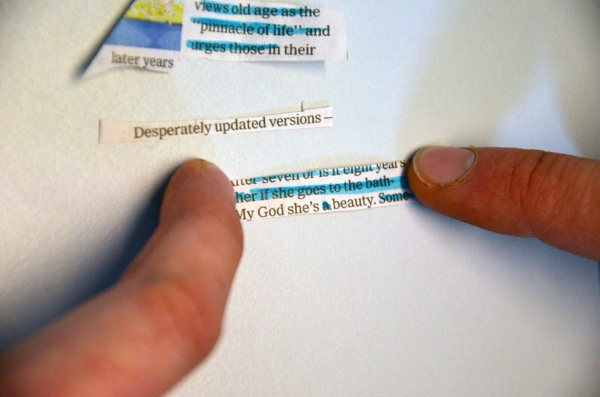
Creative process

An example of generative approach
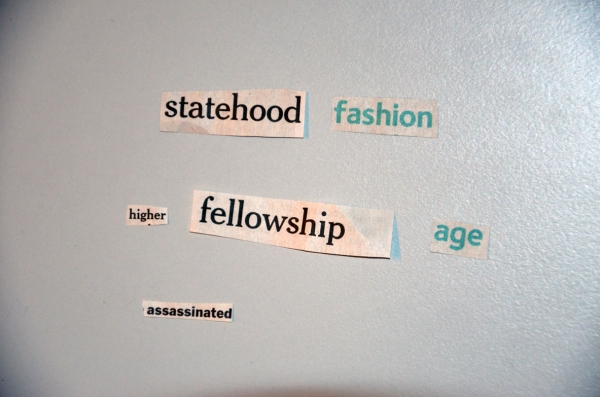
A haiku

"Immortal jelly / fish..."
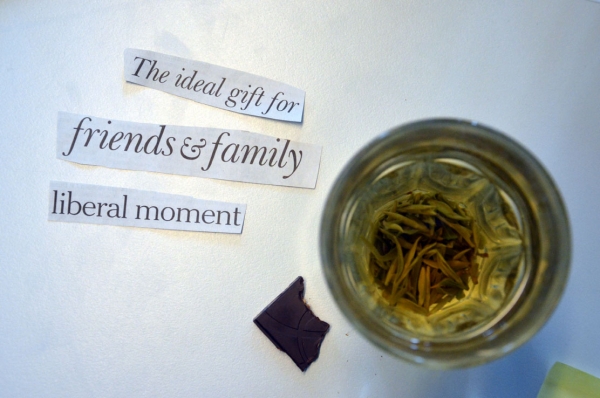
Haiku with tea
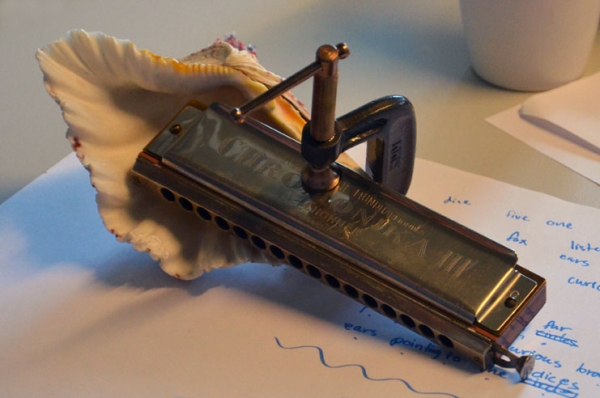
An example of associative approach

"Newspaper on Fire" exercise

Haiku creation in progress.

Haiku - December December December

Participants of the workshop

Settings of the workshop
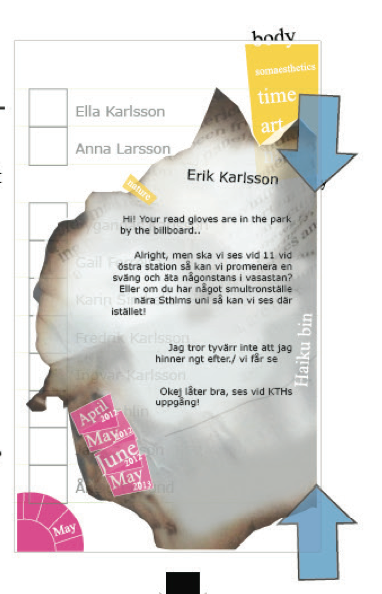
Design gained from the workshop

SMS thread in the app, drag/drop
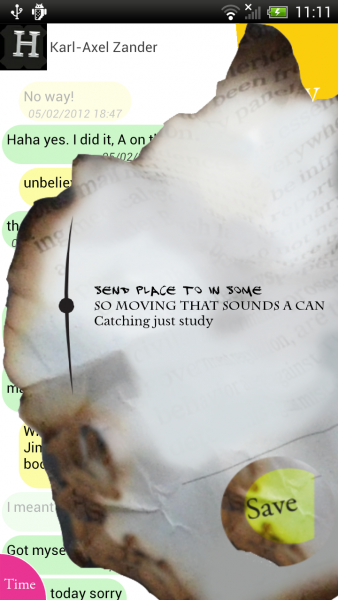
"Haiku Bin" with a generated haiku

Delete by Haiku interaction

